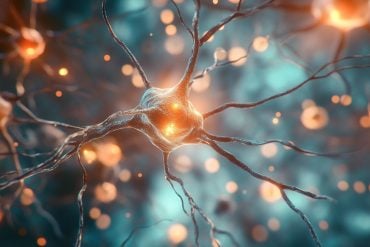Summary: Researchers believe their new study will provide a mechanistic understanding of how our microbiome and diets can impact the development of Alzheimer’s disease. The study will aim to provide evidence of possible diet induced effects on gut bacteria, which could influence age associated cognitive decline.
Source: Rush University Medical Center.
Are abnormal intestinal microorganisms a risk factor for developing cognitive impairment? Researchers at Rush University Medical Center are trying to answer that question with a new study that will explore how the intestinal microbiota – the bacteria in the intestine –influence the progression of cognitive decline and the development of Alzheimer’s disease.
Health care providers and researchers increasing are recognizing that the intestinal microbiota – also known as the microbiome – affects health. The human intestine contains tens of trillions of microorganisms, and humans have developed a symbiotic relationship with these bacteria in.
Food consumption by humans provides food/energy to this intestinal bacteria, which in turn influence health by producing numerous biologically relevant substances, including vitamins, and strongly influence the immune system. Studies show that the intestinal microbiota also influences the brain.
For example, changes in the intestinal microbiota can influence anxiety- and depression-like symptoms in rodents and can promote brain pathology in a mouse model of Parkinson’s disease.
“Diet is one of the main factors that influence the intestinal microbiota,” said Dr. Robin Voigt-Zuwala, an assistant professor in the Department of Internal Medicine at Rush who is leading the study. “Therefore, a dietary intervention provides a perfect platform to study how alterations in the intestinal microbiome influence the aging brain, cognition, and Alzheimer’s disease development.”
The study will recruit 300 volunteers from another study, the Chicago MIND cohort, which aims to show whether a dietary intervention can prevent cognitive decline and age-associated changes in the brain. The MIND diet is short for Mediterranean-DASH Diet Intervention for Neurodegenerative Delay, which is a hybrid of the Mediterranean and DASH (Dietary Approaches to Stop Hypertension) diets.
Martha Clare Morris, ScD, a Rush nutritional epidemiologist, and her colleagues developed the MIND diet based on information that has accrued from years of research about what foods and nutrients have good, and bad, effects on the functioning of the brain. “We are expanding on the goals of the MIND diet trial to mechanistically investigate if and how the microbiome influences the aging brain,” said Voigt-Zuwala.
Healthier microbiome may protect the brain
“The proposed research is significant because it will, for the first time, provide a mechanistic understanding of how the microbiome contributes to preclinical Alzheimer’s disease. This is expected to pave the way for intestine-directed treatments to prevent or delay cognitive decline, such as the MIND diet.”
Alzheimer’s disease is the most common cause of dementia, currently afflicting an estimated 5.7 million people in the United States, and has the highest drug/treatment failure rate of any disease. There is a substantial body of literature suggesting that a healthy diet is beneficial for Alzheimer’s disease prevention.
This study will be the first that seeks to provide evidence pointing to diet-induced effects on the microbiome as a critical factor that influences age-associated cognitive decline and the development of Alzheimer’s disease.
The researchers will put the study participants onto the MIND diet or a control diet for three years, and they will collect cognitive and biological data from participants every year. Participants also will provide specimens that the researchers will use to assess the intestinal microbiota with state-of-the-art techniques.

They will evaluate what bacteria are present (the bacterial community structure) and the organisms’ function, providing critical information about what bacteria are present and what they are doing. These outcomes will be correlated with cognitive outcomes and brain structure information obtained via MRI exams. A better mechanistic understanding will be revealed by examining changes in other intestinal outcomes such as “leaky gut” and changes in the immune system.
“One of the biggest challenges facing Alzheimer’s disease is that the disease process begins more than a decade before the onset of clinically detectable symptoms. Thus, intervention trials targeted at the preclinical stages of neurodegenerative disease are necessary,” Voigt-Zuwala said. “This study is an important stepping stone towards understanding the role of the intestine in age-associated cognitive decline and paves the way for the development of intestine-directed treatments to improve quality of life in older populations.”
Funding: The study is funded by the National Institutes Aging (AG052583, ORA# 15052004-IRB01-AM08).
Source: Nancy Difiore – Rush University Medical Center
Publisher: Organized by NeuroscienceNews.com.
Image Source: NeuroscienceNews.com image is in the public domain.
[cbtabs][cbtab title=”MLA”]Rush University Medical Center “Exploring the Connection Between Diet, Gut Microbes and Cognitive Decline.” NeuroscienceNews. NeuroscienceNews, 14 May 2018.
<https://neurosciencenews.com/cognition-diet-microbiome-9044/>.[/cbtab][cbtab title=”APA”]Rush University Medical Center (2018, May 14). Exploring the Connection Between Diet, Gut Microbes and Cognitive Decline. NeuroscienceNews. Retrieved May 14, 2018 from https://neurosciencenews.com/cognition-diet-microbiome-9044/[/cbtab][cbtab title=”Chicago”]Rush University Medical Center “Exploring the Connection Between Diet, Gut Microbes and Cognitive Decline.” https://neurosciencenews.com/cognition-diet-microbiome-9044/ (accessed May 14, 2018).[/cbtab][/cbtabs]







